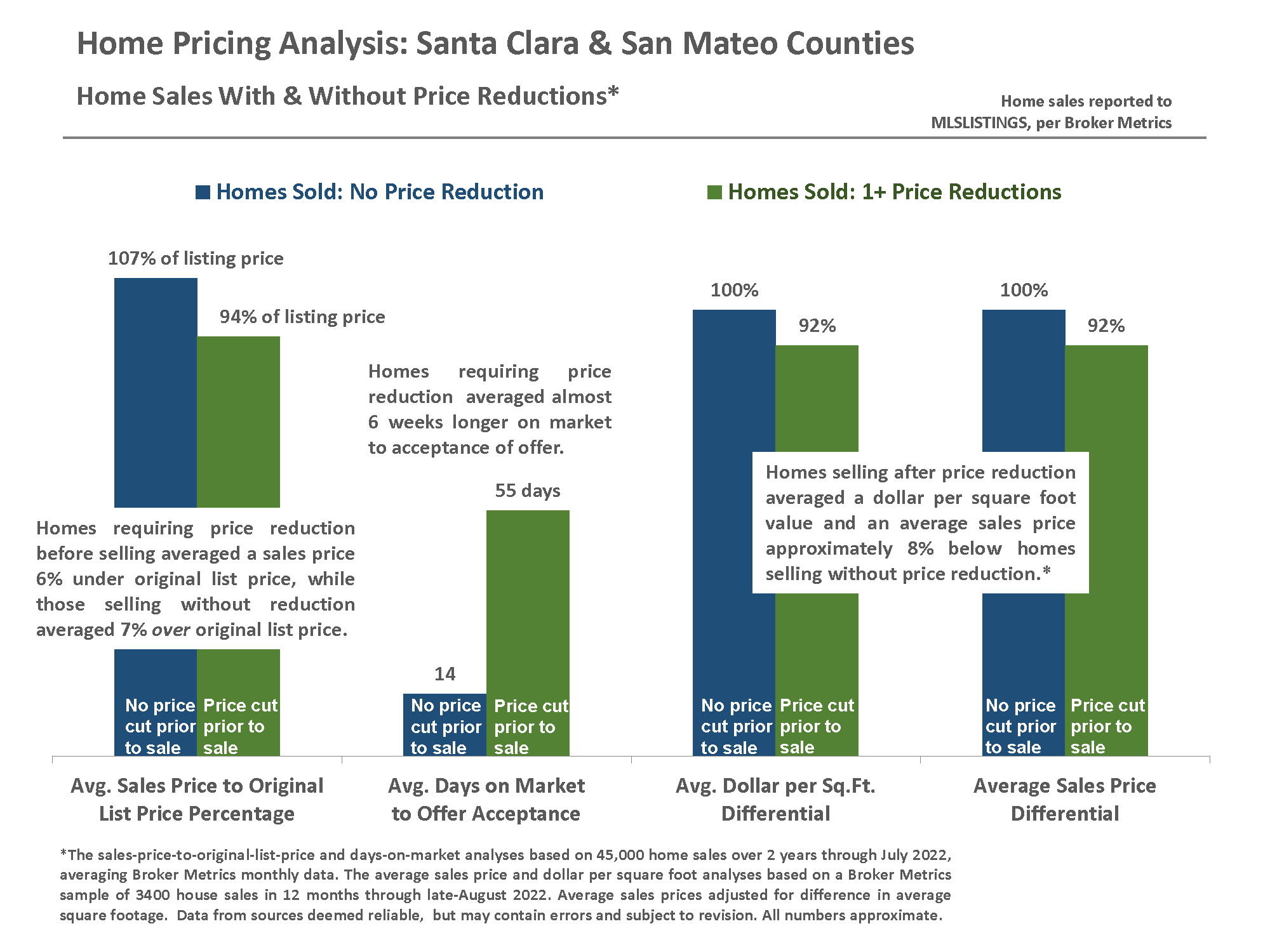by Sophia Xu, Realtor, CPA
Across Bay Area markets, home listings that require price reductions before selling consistently take much longer to sell and sell for significantly lower than average values compared to homes priced correctly. The correct calculation of “fair market value” typically has large economic consequences for the seller.
Conversely, overpriced homes can provide opportunities for buyers who carefully track days-on-market and price reductions (as well as homes taken off the market without selling). Such buyers will almost always face reduced competition from other buyers – often no competition, which generally eliminates the need for overbidding – and allows for more aggressive negotiation of the purchase price and terms of sale.
The truth about home pricing
“Ironically, instead of getting more money... [Over-pricing] usually stigmatizes a property and reduces the eventual sale price to less than it would have been with more realistic pricing.” -House Selling for Dummies
As one of the Bay Area’s top realtors, there are four truths regarding pricing a home that I am guided by to ensure I can help my clients achieve the best results in their home selling journey:
- Fair market value is the price a qualified, reasonably knowledgeable buyer is willing to pay, which a seller, not under duress, is willing to accept after the home has been properly exposed to the market.
- Neither agents nor sellers determine market value: Only the market itself – willing and able buyers – establishes home value. A comprehensive comparative market analysis is the best way to estimate current fair market value prior to listing the home for sale. An agent and seller then work together to create a plan – pricing, preparation and marketing – to maximize the conditions that reliably achieve the highest possible sales price.
- The vast majority of buyers will not make offers on homes they consider significantly overpriced. Either they don’t want to waste their time, or are uncomfortable with possibly “offending” the seller. In any case, they simply move on to other listings.
- Well-priced homes create a sense of urgency in the buyer/broker communities to act quickly with strong, clean offers, and often lead to competitive bidding between buyers – which is the most likely way to increase sales price.
The cost of overpricing a home
While it may be tempting to list a home at price based on instinct or desire, failing to take the four truths mentioned above into consideration will often result in a disappointing sale. Read on to understand why:
Overpricing wastes the optimal moment of buyer and broker attention: when it first comes on the market. This moment cannot be recaptured.
Overpriced homes attract the wrong buyers. It will not compare favorably with the realistically-valued homes in a buyer’s price bracket.
Overpriced homes kill any sense of buyer urgency and take much longer to sell, which then significantly reduces value in buyers’ minds: “There must be something wrong with it if it hasn’t sold by now.” It almost always eliminates the possibility of competitive bidding.
Overpricing helps sell competitive properties, since they stand out as good values in comparison.
In order to win the listing, some agents suggest a list price considerably higher than what market conditions and comparable sales justify—because they believe this is what the seller wants to hear. This is called “buying the listing” and is a violation of the fiduciary duty of honesty that an agent owes their client. The agents know the home is overpriced from the beginning. They believe they can buy the listing up front and then convince the homeowner to lower the price until the home sells.
If a buyer absolutely loves a home and is willing to pay the full asking price that’s considerably higher than the fair market value, the buyer might run into appraisal issues later on. The buyer’s bank will likely decline the mortgage unless the buyer has a substantial down payment, and the buyer likely experiences buyer’s remorse as he/she may worry about overpaying too much.
Compared to homes selling without price reduction, Average Sale Price and Price per Sq. Ft. are approximately 8% lower for homes selling after price reduction. In the Bay Area, an 8% price difference can mean tens or even thousands of dollars.

Stay realistic on home pricing
Pricing is the most important marketing strategy (yes, marketing!) when selling a home. All of the beautiful marketing materials and advertising in the world will not sell an overpriced home. If the price is too high, the rest of the marketing will be pointless.
- Price it right to begin with
- Prepare the home to show in its best possible light
- Implement the most comprehensive marketing plan possible
- Hire an agent who knows how to negotiate effectively on your behalf, and manage the disclosure and due diligence processes.
If a listing has inadvertently been overpriced (or market conditions suddenly cool), the sooner it is recognized as such and the price adjusted, the smaller the negative impact will be. Price reductions must be big enough to regain the attention of buyers and their agents – typically, at least 5%.
Would you like this sort of insight and data to help you make an informed decision in your next real estate transaction? Or a complementary analysis of your home value in the current and ever-evolving market? Contact Sophia to start. She can go over the selling process, all the data and strategies she’s used to help hundreds of clients, and make sure your home is priced right for the optimum outcome.


